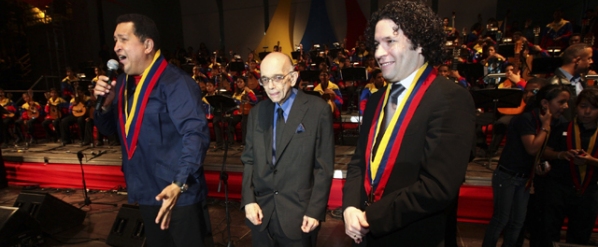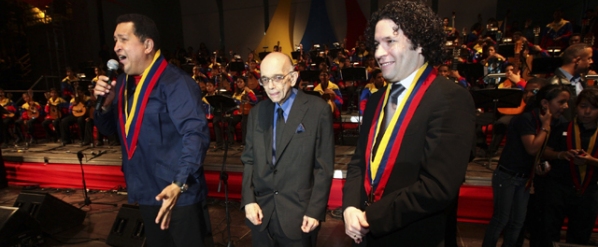Images like this one make us uncomfortable, but pretend as we like, culture is inextricably linked with politics. Artistic expression rarely exists without some kind of subsidy, and the disposition of tax monies on all its forms is habitually scrutinized and challenged with a fervour grossly disproportionate to the total expenditure. And when the federal allocation for a national orchestra program in a South American country one tenth the population of the US is roughly equal in real dollars to the entire budget of the National Endowment for the Arts, controversy about the nature of the relationship between parties- and its obligations – is virtually guaranteed.
Is el Sistema the political tool of an aspiring dictator, or the victim? Historically, when art has been conscripted into the service of politics, three things happen, often in close sequence.
- Bureaucrats become musical experts
In a speech before a concert in 1919, Anatoly Lunacharsky, the Commissar of Education of the Soviet Union, decreed that “Major keys possess the characteristics of lifting a sound a semitone. By their exultant sense of joy such sounds elevate the mood; they cheer you up. By contrast, minor keys droop; they lead to a compromise, to a surrender of social positions. […] Major tonalities are Bolshevik music, whereas minor keys are deeply rooted in Menshevik mentality.”
Enough said. - Censorship ensues
The natural extension of politically acceptable tonalities is politically acceptable music. In the early 1930s, as part of their systematic effort to destroy Jewish and minority culture in Germany, the Nazi party and Joseph Goebbels instituted the Reichmusikkammer to promote those composers deemed ethnically and ideologically consistent with the Nazi socio-cultural agenda while demonizing the remainder as purveyors of Entartete Musik, or “Degenerate Music.” Composers like Gustav Mahler, Felix Mendelssohn and Paul Hindemith were banned while the Third Reich exalted nationalistic mediocrities who have long since faded into obscurity.
- Appointments become politicized
The final step of the policy of controlling music is to control musicians. In the case of Nazi Germany, this meant terminating the employment of targeted minorities from orchestras. Administrative or artistic positions of all degrees of prestige became sinecures for party loyalists regardless of their competence. In the Soviet Union, regional orchestras effectively became mouthpieces for a centrally-determined artistic agenda, as an integral part of a larger strategy of cultural imperialism in an extremely large and diverse nation.
Notably absent from this list is the co-opting of existing musical activity for political purposes, the accusation leveled most frequently at Chávez, for the simple reason this happens on both sides of the political and governmental spectrum. The Marseillaise was written as a musical rally for a French military division in the years immediately following the Revolution, and over the next 8 decades was alternately banned or raised to the status of national anthem several times. More recently, protest songs have found a special place in the repertoire and the zeitgeist of the 20th Century. If music can have social impact, it can certainly have political impact for both sides.
Despite widespread accusations of vote tampering, voter intimidation, and politically-motivated prosecutions in the country, Venezuela under Chávez remains a far cry from Germany under Hitler or the Soviet Union under Stalin. Yet if the FundaBol were becoming a political tool, some of these three conditions would start to manifest. One by one:
While Hugo Chávez has openly stated the domestic importance of the work of the Fundación, and the primary role said work will play in Venezuelan international diplomacy, there has been minimal public opining on purely musical matters. The reporting relation between the Fundación and the office of the President is also not unique, indicative only of the importance ascribed to the work. In Colombia, the national agency Acción Social is officially a program of the office of the President, and in the United Kingdom, Ofsted (the national educational inspectors) holds office under the Crown, not any ministry.
When Henrique Capriles, Governor of Miranda State in Venezuela, emerged as Chávez’s lead contender for the presidential elections, government-run media was quick to denounce him as a homosexual Jew because of his ancestry and ongoing bachelorhood, using terms that would make Mahmoud Ahamdinejad blush. The same media regularly excoriate the US for a multitude of perceived sins, including some utterly laughable ones. Yet the Klezmer-infused Symphony No. 1 by Mahler is a staple of the Venezuelan repertoire, and the favourite encore of Sistema orchestras is the “Mambo” from Leonard Bernstein’s West Side Story Symphonic Dances. It’s doubtful whether the average man on the street anywhere would know that both composers are Jewish, and that Bernstein, American musical icon, was attracted to both genders, but the virulently anti-Semitic and homophobic attacks on Capriles have not influenced orchestra programming, nor has the anti-American rhetoric. Chávez’s own nationalistic taste in music might be construed as an appropriate attitude for any political leader.
Given the size and scope of the Fundación’s activities in Venezuela, it’s possible but unlikely that this has become an issue on the administrative side, and no public examples on the artistic side exist. This of course may be put to the test when Maestro Abreu passes away (may the day be long delayed), should Chávez still be in power then, but lucrative patronage appointments are the staple of democratic governments in developed nations worldwide. As is election tampering, for that matter.

Beyond the shameless photo-opping, it’s difficult to see any real political influence currently exerted upon the Fundación. That may change at any moment, given the impending presidential elections, but to date Chávez’s influence appears to have been more benign or beneficial, his political tenure well-timed to coincide with the program’s rise to international fame, and his most concrete action a major increase in its funding. His support does not excuse his tolerance for or complicity with political and social crimes, but for his opponents to decry Sistema as his propaganda tool is simply incorrect. Sistema’s best defense against these accusations is its fame: the international community would immediately note and condemn any real attempt to subvert its mission for the benefit of one person. It is Venezuela’s highest profile international institution, and just as American Presidents have their picture taken with championship sports teams, Chávez seeks that association with a successful entity too. It’s part of another time-honoured political tradition: taking credit for other people’s successes.
http://www.dailymotion.com/video/xa0c39_comandante-chavez-otorgo-28-indulto_news


No political leader in his right mind wants to be on the wrong side of a piece of music that has the power to unify a people. Does not Putin now dance to Beatles tunes?
Prime Minister Vladimir Putin explained that Beatles music “…was like an open window to the world.” Author/Sociologist Artemy Troitsky said, “The Beatles, Paul and John, George and Ringo, have done more for the fall of communism than any other Western institution.”–from the Mind of God by Paul Cochrane.
As soon as a people yearning to be free find a voice for their aspirations in poetry and song– game over. There is no turning back or giving up. No dictator can exert control over such a contagion, such a social ear worm. Even the Syrians will discover that you can’t stop an idea conveyed in song with bombs when it now storms the planet at the speed of light. No intelligent political leader of the future wants to challenge a force with the potential to become a hurricane.
Recognizing the power of music’s potential, it weighs a heavy responsibility on those of us who seek to pursue social change through music and the arts. We are placing powerful medicine in the hands of children.